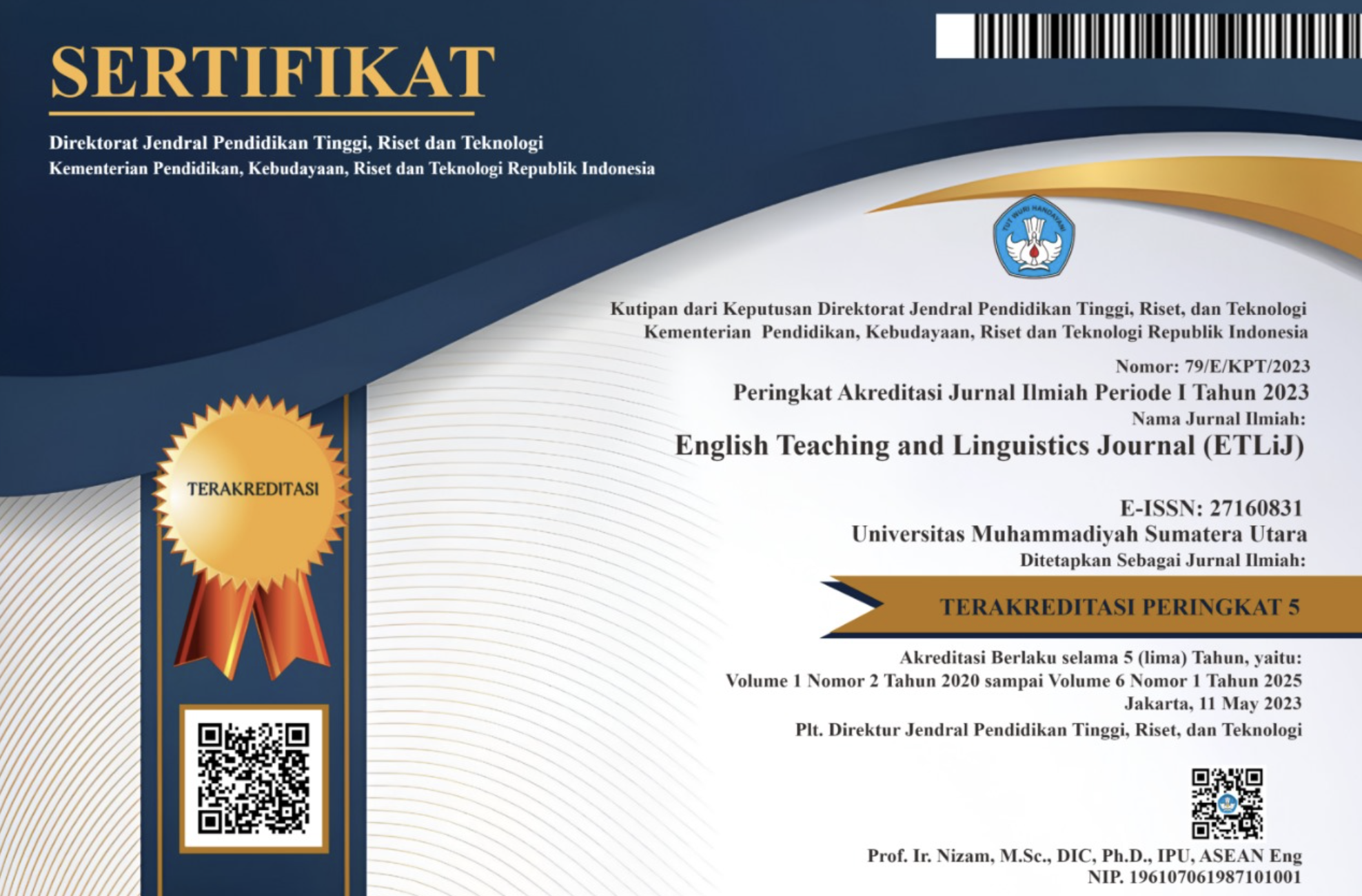English Teacher Identity in EFL Higher Education: Exploring Perspective from Critical Reflection
Abstract
Teacher identity has a significant impact on teachers’ decisions on teaching processes, teaching and learning material, teacher-student relationships, and professional development. However, in its implementation, there is unclear identity that confuses the standards, and a lack of charisma in the EFL teacher profile, while an ideal language teacher is crucial to building a successful learning to foreign language. Data taken from critical reflection (Rolfe, 2014) written by English education department students. They are university students who joins English Phonetics and Phonology class. The tutor facilitates the teaching learning based on the principal of critical language awareness. Data are analyzed based on the foundation the framework Van Dijk identity construction (van Dijk, 2015). There result shows that identity represented to what someone thinking, belief, and perceive, and it realizes into social practice (teaching and learning English as foreign language). In this context, it creates the teacher or lecturer to be the agent of change. For the research, interview should be conducted to explore deeper understanding how the teacher construct EFL identity to support the success of EFL teaching learning process.
Keywords
Full Text:
PDFReferences
Abdullah, F., Hidayati, A. N., Andriani, A., Silvani, D., Ruslan, Tandiana, S. T., & Lisnawati, N. (2022). Fostering Students’ Multimodal Communicative Competence through Genre-Based Multimodal Text Analysis. Studies in English Language and Education, 9(2), 632–650. https://doi.org/10.24815/siele.v9i2.23440
Andriani, Agis & Abdullah, F. (2017). Invigorating the EFL students in acquiring new linguistic knowledge: Language learning through projects. Proceedings of the 4th International Language and Language Teaching Conference, 1–15.
Andriani, A. (2014). “My Teacher is like a Mirror”: The Students’ Perspectives on Their Non-Native English Speaking Teacher. In I. Cahyono, B.Y: Emaliana (Ed.), Success Stories in English Language Teaching and Learning (pp. 239–247). State University of Malang.
Andriani, A. (2015). Professional Identity Via Head Acts, Supportive Moves, And Internal Modifications in Teacher’s Requesting. Proceedings 3rd IMCoSS (The Third International Multidisciplinary Conference on Social Sciences, 82–86.
Andriani, A. (2022). Masaku Ceritaku: Dua Puluh Tahun Lalu Itu. In A. N. Andriani, Agis, Abdullah Fuad, and Hidayati (Ed.), Kisahku Kepadamu refleksi Profesionalisme dalam Pendidikan (1st ed., pp. 3–9). Dotplus.
Avidov-Ungar, O., & Forkosh-Baruch, A. (2018). Professional identity of teacher educators in the digital era in light of demands of pedagogical innovation. Teaching and Teacher Education, 73, 183–191. https://doi.org/10.1016/j.tate.2018.03.017
Barkhuizen, G., & Mendieta, J. (2020). Teacher Identity and Good Language Teachers. In Lessons from Good Language Teachers (pp. 3–15). Cambridge University Press. https://doi.org/10.1017/9781108774390.004
Beauchamp, C., & Thomas, L. (2009). Understanding teacher identity: An overview of issues in the literature and implications for teacher education. Cambridge Journal of Education, 39(2), 175–189. https://doi.org/10.1080/03057640902902252
Beijaard, D., Meijer, P. C., & Verloop, N. (2004). Reconsidering research on teachers’ professional identity. Teaching and Teacher Education, 20(2), 107–128. https://doi.org/10.1016/j.tate.2003.07.001
Braun, V., & Clarke, V. (2006). Using thematic analysis in psychology. Qualitative Research in Psychology, 3(2), 77–101.
Breckenridge, Y. M. (2010). Professional Identity and the “native speaker”: An Investigation of Essentializing Discourses in TESOL.
Burić, I., & Moè, A. (2020). What makes teachers enthusiastic: The interplay of positive affect, self-efficacy and job satisfaction. Teaching and Teacher Education, 89. https://doi.org/10.1016/j.tate.2019.103008
Cheung, Y. L., Said, S. Ben, & Park, K. (2014). Advances and current trends in language teacher identity research. In Advances and Current Trends in Language Teacher Identity Research. Taylor and Francis Inc. https://doi.org/10.4324/9781315775135
Clots-Figueras, I., & Masella, P. (2013). Education, language and identity. Economic Journal, 123(570). https://doi.org/10.1111/ecoj.12051
Craft, A. (1997). Identity and creativity: Educating teachers for postmodernism? Teacher Development, 1(1), 83–96. https://doi.org/10.1080/13664539700200001
Efendi, S., & Zulhendra, D. (2024). Strategi Pengembangan Profesionalisme Pendidik di Era Digital. ARINI: Jurnal Ilmiah Dan Karya Inovasi Guru, 1(1), 53–66.
Geursen, J., de Heer, A., Korthagen, F. A. J., Lunenberg, M., & Zwart, R. (2010). The importance of being aware: Developing professional identities in educators and researchers. Studying Teacher Education, 6(3), 291–302. https://doi.org/10.1080/17425964.2010.518685
Greenwood, J. (2009). Creativity and identity. Access: Contemporary Issues In Education, 28(1), 37–46.
Hasibuan, N., & Ichsanda Rahman Hz, B. (2024). Preparedness in Implementing Merdeka Curriculum: Insights from Indonesian EFL Teachers Corresponding Email Article’s History. Ethical Lingua, 11(1), 147–160. https://doi.org/10.30605/25409190.686
Hersi, M. A. (2018). Teachers’ Professional Identity Construction: A Narrative Inquiry Of Non-Native English Speaking Teachers In Saudi ARABIA. https://digitalrepository.unm.edu/educ_llss_etds."
Huang, X., Chi-Kin Lee, J., Yang, X., Tsybulsky, D., Muchnik-Rozanov, Y., File, K. A., Schnurr, S., Carpenter, J. P., Kimmons, R., Short, C. R., Clements, K., Staples, M. E., Orthaber, S., Moody, S. J., Sierra, S., & Van De Mieroop, D. (2019). Linguistic and ethnic media stereotypes in everyday talk: Humor and identity construction among friends. Journal of Pragmatics, 152, 48–59. https://doi.org/https://doi.org/10.1016/j.tate.2019.01.011
Husaini, R. (2018). PEMBINAAN PROFESIONALISME GURU. In Jurnal Ilmaih Pendidikan Agama Islam (Vol. 8, Issue 2). Juli-Desember.
Izadinia, M. (2013). A review of research on student teachers’ professional identity. In British Educational Research Journal (Vol. 39, Issue 4, pp. 694–713). https://doi.org/10.1080/01411926.2012.679614
Jiang, A. L., & Zhang, L. J. (2021). Teacher Learning as Identity Change: The Case of EFL Teachers in the Context of Curriculum Reform. TESOL Quarterly, 55(1), 271–284. https://doi.org/10.1002/tesq.3017
Kaplan, A., & Flum, H. (2012). Identity formation in educational settings: A critical focus for education in the 21st century. Contemporary Educational Psychology, 37(3), 171–175. https://doi.org/10.1016/j.cedpsych.2012.01.005
Kayi-Aydar, H. (2019). Language teacher identity. In Language Teaching (Vol. 52, Issue 3, pp. 281–295). Cambridge University Press. https://doi.org/10.1017/S0261444819000223
Khany, R., & Malekzadeh, P. (2015). Associations among EFL Teachers’ Professional Identity, Professional Vitality, and Creativity. In Teaching English Language (Vol. 9, Issue 2).
Konstantinidis, A., & Badia, A. (2019). Inquirer Teacher Identity During An Educational Innovation.
Lewyckyj, J. W. (2021). Cultivating innovation: An exploration of teacher professional identity and innovative work behavior in private catholic schools.
Manik, W., Jannah, M., & Lubis, H. F. A. N. (2024). Tuntutan Kompetensi Guru Abad Ke-21. Jurnal Ilmiah Multidisiplin Terpadu, 8(12). Jurnal Ilmiah Multidisiplin Terpadu, 8(12).
Medgyes, P. (2001). When the teacher is a non-native speaker. Teaching English as a Second or Foreign Language, 429–442.
Mohammaditabar, M., Bagheri, M. S., Yamini, M., & Ehsan Rasaee, M. (2020). Qualities of a good english language teacher from the perspectives of textbook authors in the field of language teaching, teachers, and learners. Qualitative Report, 25(11), 3927–3961. https://doi.org/10.46743/2160-3715/2020.4501
Morton, T. (2018). Social interaction and English language teacher identity. Edinburgh University Press. http://www.euppublishing.com/series/ssint
Nero, S. (2006). Language, identity, and education of caribbean English speakers. World Englishes, 25(3–4), 501–511. https://doi.org/10.1111/j.1467-971X.2006.00470.x
Panchenko, L. (2021). Digital storytelling in adult education: barriers and ways to overcome them. Educational Technology Quarterly, 2021(4), 673–688. https://doi.org/10.55056/etq.41
Payne, P. (2000). Identity and Environmental Education. Environmental Education Research, 7(1). https://doi.org/10.1080/1350462002002352
Pennington, M. C., & Richards, J. C. (2016). Teacher Identity in Language Teaching: Integrating Personal, Contextual, and Professional Factors. RELC Journal, 47(1), 5–23. https://doi.org/10.1177/0033688216631219
Reimers, F. (2006). Citizenship, identity and education: Examining the public purposes of schools in an age of globalization. Prospects, 36(3), 275–294.
Richards, K. (2006). “Being the teacher”: Identity and classroom conversation Word count. Applied Linguistics, 27(1), 51–77.
Rolfe, G. (2014). Reach touch and teach. Terry Borton. Nurse Education Today, 34(4), 488–489. https://doi.org/10.1016/j.nedt.2013.11.003
Rushton, E. A. C., Rawlings Smith, E., Steadman, S., & Towers, E. (2023). Understanding teacher identity in teachers’ professional lives: A systematic review of the literature. In Review of Education (Vol. 11, Issue 2). John Wiley and Sons Inc. https://doi.org/10.1002/rev3.3417
Sachs, J. (2001). Teacher professional identity: Competing discourses, competing outcomes. Journal of Education Policy, 16(2), 149–161. https://doi.org/10.1080/02680930116819
Sang, Y. (2022). Research of Language Teacher Identity: Status Quo and Future Directions. RELC Journal, 53(3), 731–738. https://doi.org/10.1177/0033688220961567
Schachter, E. P., & Rich, Y. (2011). Identity education: A conceptual framework for educational researchers and practitioners. Educational Psychologist, 46(4), 222–238. https://doi.org/10.1080/00461520.2011.614509
Shcherbakova, T., Misirov, D., Guseva, T., Alexandrova, N., & Shostak, Y. (2020). The personality of the future teacher in the context of the challenges of the innovation space. E3S Web of Conferences, 210. https://doi.org/10.1051/e3sconf/202021018049
Tajeddin, Z., & Griffiths, C. (2020). Good Language Teachers: Past, Present, and Future Directions. In Lessons from Good Language Teachers (pp. 298–308). Cambridge University Press. https://doi.org/10.1017/9781108774390.026
Tintingon, J. Y., Usoh, E. J., & Sumual, T. E. M. (2023). Pengembangan Sumber Daya Pendidik Melalui Peningkatan Kualitas Pendidikan Profesi Guru Prajabatan di Indonesia. El-Idare: Jurnal Manajemen Pendidikan Islam, 9(1), 85–94. https://doi.org/10.19109/elidare.v9i1.16928
Varghese, M., Morgan, B., Johnston, B., & Johnson, K. A. (2005). Theorizing Language Teacher Identity: Three Perspectives and Beyond. Journal of Language, Identity & Education, 4(1), 21–44. https://doi.org/10.1207/s15327701jlie0401_2
van Dijk, T. A. (2015). Critical Discourse Analysis. In and D. S. Deborah Tannen, Heidi E. Hamilton (Ed.), The Handbook of Discourse Study (second edi). John Wiley & Sons, Inc. https://doi.org/10.4135/9781473983953.n41
Van Dijk, T. A. (2015). Critical Discourse Analysis. In The Handbook of Discourse Analysis (pp. 466–485). https://doi.org/https://doi.org/10.1002/9781118584194.ch22
Walkington, J. (2005). Becoming a teacher: encouraging development of teacher identity through reflective practice. Asia-Pacific Journal of Teacher Education, 33(1), 53–64. https://doi.org/10.1080/1359866052000341124
Yazan, B. (2018a). Identity and NNESTs . In The TESOL Encyclopedia of English Language Teaching (pp. 1–7). Wiley. https://doi.org/10.1002/9781118784235.eelt0020
Yazan, B. (2018b). A Conceptual Framework to Understand Language Teacher Identities. In Journal of Second Language Teacher Education (Vol. 1, Issue 1).
Zembylas, M. (2003). Emotions and teacher identity: A poststructural perspective. In Teachers and Teaching: Theory and Practice (Vol. 9, Issue 3, pp. 213–238). https://doi.org/10.1080/13540600309378
Zhang, Y. (2016). Reviewing non-native English-speaking teachers’ professional identity. International Journal of Languages’ Education, 1(Volume 4 Issue 3), 320–320. https://doi.org/10.18298/ijlet.644
DOI: https://doi.org/10.30596/etlij.v6i2.24466
Refbacks
- There are currently no refbacks.

This work is licensed under a Creative Commons Attribution 3.0 License
ISSN: 2716-0831





